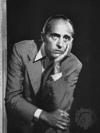- Clair, René
-
Clair (klâr), René. Originally René Chomette. 1898-1981.
French filmmaker. An early exponent of productions with sound, he directed the classics Sous les Toits de Paris (1929) and Le Million (1931).
* * *
born Nov. 11, 1898, Paris, Francedied March 15, 1981, Neuilly-sur-SeineFrench film director.He acted in silent films from 1920 until 1923, when he wrote and directed Paris qui dort. That film, along with Entr'acte (1924) and the satiric farce The Italian Straw Hat (1927), established his reputation as a leader of the avant-garde. He used sound creatively in early talkies such as Sous les toits de Paris (1930) and A nous la liberté! (1931). The Ghost Goes West (1935), made in England, was an international success. During World War II he directed several Hollywood films, including And Then There Were None (1945), then returned to France to make Le Silence est d'or (1947) and Les Belles de nuit (1952). Clair, photograph by Yousuf Karsh© Karsh from Rapho/Photo Researchers
Clair, photograph by Yousuf Karsh© Karsh from Rapho/Photo Researchers* * *
▪ French directorborn November 11, 1898, Paris, Francedied March 15, 1981, Neuilly-sur-SeineFrench director of silent films and talking pictures, whose productions were noted for humour and burlesque and also often for fantasy or surrealism. Among his major films were Paris qui dort (1924), Un Chapeau de paille d'Italie (1927), Sous les toits de Paris (1930), Le Million (1931), À nous la liberté! (1931), The Ghost Goes West (1935), and Le Silence est d'or (1947).Clair was raised in the market quarter of Paris, the memory of which inspired some of his films. During World War I he served with the French ambulance corps, and afterward he worked as a journalist, critic, and songwriter before entering motion pictures as an actor in 1920, when he adopted the name of Clair. He also wrote film criticism and worked as an assistant director. In 1923 he wrote and directed his first film, Paris qui dort, also shown under the title The Crazy Ray. His next film, Entr'acte (1924), which was created to be shown between acts of a ballet by the modernist French composer Erik Satie (Satie, Erik), featured in its cast some of the most innovative artists of the day, including Satie and the Dadaist painters Marcel Duchamp (Duchamp, Marcel), Francis Picabia (Picabia, Francis), and Man Ray. These two films established Clair as a leader of the avant-garde. The great Russian writer Vladimir Mayakovsky (Mayakovsky, Vladimir Vladimirovich) wrote a scenario especially for him, though it was never produced. Subsequently, in such films as Un Chapeau de paille d'Italie, based on the farce by Eugène Labiche, he combined the avant-garde and the popular, modernity and tradition, in an original way. During this time he also published a novel, Adams (1926), written in a cerebral and elliptical style.The advent of sound in motion pictures in the late 1920s disoriented Clair until he recognized that sound need not kill the art of the film, as he had predicted it would. He learned to use sound not as a duplicate or substitute for visual representation but rather as a counterpoint to it. His Sous les toits de Paris, Le Million, and À nous la liberté! constituted homage to the art of silent film and a manifesto for a new cinema. Clair rigorously constructed comical situations using either images or sounds independently, and his skillful use of music (musical film) to further the narrative—rather than for production numbers in the manner of stage musicals—introduced a new form of musical film. The satirical edge of these films and his Le Dernier Milliardaire (1934), an antifascist film banned in Germany and elsewhere, resulted in political and financial difficulties for Clair. He went to England to make The Ghost Goes West, an effective merging of English humour with French verve that became an international triumph. He returned to France but soon left again, in 1940, when the Germans overran the country in World War II. He spent the war years in Hollywood, where he made The Flame of New Orleans (1940), which was not successful. His I Married a Witch (1942), however, was well received, as were It Happened Tomorrow (1944), the most striking of his fantastic comedies, and And Then There Were None (1945), an adaptation of a mystery by Agatha Christie. After the war, he returned to France, where he made Le Silence est d'or, a masterful renewal of his Parisian past and his youth, which was to be his artistic testament. Though Clair's subsequent films, such as La Beauté du diable (1949), which propounded the Faust theme, and Les Grandes Manoeuvres (1955), a seriocomedy in a 1914 setting, were noteworthy, they were not equal to his earlier French films. In 1960 he was elected to the French Academy.Clair gained recognition as a creative artist long before screenwriters and directors generally were accorded serious critical attention. Each of his films revived and enriched his own wonderfully diverse view of the world. This poetic universe often centred on Paris, and Clair has been called the most French of filmmakers. His penchant for invention, research, and experimentation allied him to the pioneers of the film art; for him to create a motion picture was not merely to express but to invent cinematically. Far from limiting his work to the avant-garde, however, he applied his techniques to comedies that poked fun at everyday life and were appreciated by vast audiences of moviegoers. His art, the refined and sentient art of an intellectual, was also a popular art.Barthélemy AmengualAdditional ReadingCelia McGerr, René Clair (1980), outlines his film career and analyzes the films. More detailed descriptions can be found in R.C. Dale, The Films of René Clair, 2 vol. (1986). Further bibliographic information is provided by Naomi Greene, René Clair: A Guide to References and Resources (1985).* * *
Universalium. 2010.
